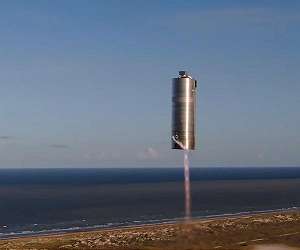SpaceX launched its 10th batch of Starlink satellites in Florida early Friday morning. The mission which has been delayed repeatedly this summer lifted off as planned at 1:12 a.m. EDT from Launch Complex 39A at Kennedy Space Center. Elon Musk’s SpaceX owns the Starlink communication satellites; the additional two payloads are Earth observation satellites for Seattle-based BlackSky Global.
SpaceX has delayed the launch at least four times due to weather or technical issues. A 30% chance exists that storm clouds or showers could delay the launch Friday, according to U.S. Space Force forecast.
The successful launch will bring the total number of Starlink spacecraft in orbit to nearly 600, as SpaceX prepares to roll out broader testing of the network’s broadband Internet service.
The mission was the 10th for SpaceX’s Starlink since May 2019. The frequent pace of launches means SpaceX can carry other ride-sharing customers, such as BlackSky, for revenue.
SpaceX launched three small imaging satellites for San Francisco-based Planet, formerly Planet Labs, in mid-June.
SpaceX has planned 30 rocket launches in 2020 and 2021 that can accommodate other small satellites.
BlackSky offers images and monitoring from space for industries that include defense, energy, construction and research. The firm obtained a $50 million investment in 2019 from Luxembourg-based Intelsat, a communications satellite service, to build its new constellation of Earth-imaging satellites.
A successful launch would boost BlackSky’s space network to six satellites, with a short-term goal of 16 satellites in orbit. They weigh about 120 pounds each and are designed to last only a few years before they need replacement.
Source: United Press International

SpaceX completes test flight of Mars rocket prototype
Houston (AFP) Aug 5, 2020
SpaceX on Tuesday successfully completed a flight of less than a minute of the largest prototype ever tested of the future rocket Starship, which the company hopes to use one day to colonize Mars.
“Mars is looking real,” SpaceX founder Elon Musk tweeted in response to a fan.
The current Starship prototype is fairly crude: it’s a large metallic cylinder, built in a few weeks by SpaceX teams on the Texas coast, in Boca Chica – but it’s still smaller than the actual rocket will be.
Several pre … read more
– Advertisement –